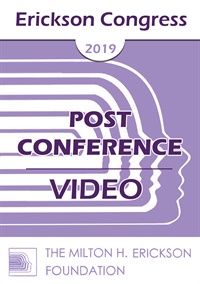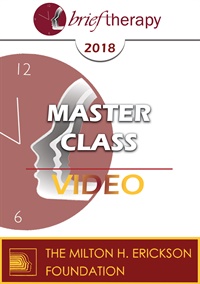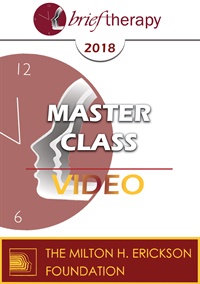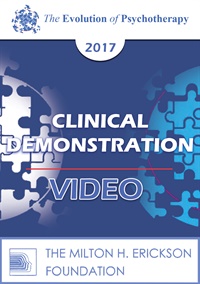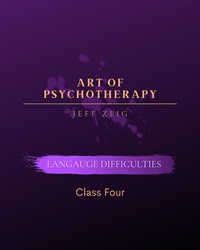
- Average Rating:
- Not yet rated
- Topic Areas:
- Clinical Demonstrations | Experiential Therapy | Psychotherapy | Therapist Development | Art and Creativity | Ericksonian Psychotherapy | Art of Psychotherapy
- Bundle(s):
- Art of Psychotherapy - Experiential Series
- Categories:
- Art of Psychotherapy
- Faculty:
- Jeffrey Zeig, PhD
- Course Levels:
- Master Degree or Higher in Health-Related Field
- Duration:
- 2 Hours 15 Minutes
- Format:
- Audio and Video
- Original Program Date:
- Jun 07, 2020
- Short Description:
- In our final class of this series, our demonstration subject has an impediment in learning the German language.
- Price:
- $79.00 - Base Price
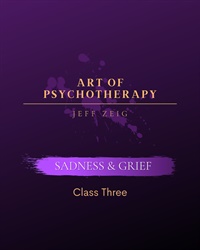
- Average Rating:
- Not yet rated
- Topic Areas:
- Clinical Demonstrations | Experiential Therapy | Grief | Psychotherapy | Therapist Development | Art and Creativity | Ericksonian Psychotherapy | Art of Psychotherapy
- Bundle(s):
- Art of Psychotherapy - Experiential Series
- Categories:
- Art of Psychotherapy
- Faculty:
- Jeffrey Zeig, PhD
- Course Levels:
- Master Degree or Higher in Health-Related Field
- Duration:
- 2 hours 22 minutes
- Format:
- Audio and Video
- Original Program Date:
- May 31, 2020
- Short Description:
- The presenting problem for Class 3 is an issue with expressing sadness and grief.
- Price:
- $79.00 - Base Price
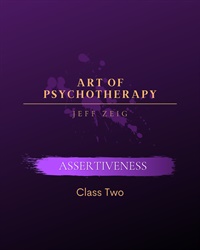
- Average Rating:
- Not yet rated
- Topic Areas:
- Clinical Demonstrations | Experiential Therapy | Psychotherapy | Therapist Development | Art and Creativity | Ericksonian Psychotherapy | Art of Psychotherapy
- Bundle(s):
- Art of Psychotherapy - Experiential Series
- Categories:
- Art of Psychotherapy
- Faculty:
- Jeffrey Zeig, PhD
- Course Levels:
- Master Degree or Higher in Health-Related Field
- Duration:
- 2 Hours 25 Minutes
- Format:
- Audio and Video
- Original Program Date:
- May 24, 2020
- Short Description:
- Our demonstration subject for Class 2 is a psychiatrist who would like to become a better leader.
- Price:
- $79.00 - Base Price
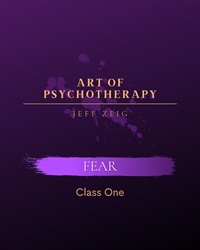
- Average Rating:
- Not yet rated
- Topic Areas:
- Experiential Therapy | Clinical Demonstrations | Phobia | Psychotherapy | Therapist Development | Art and Creativity | Ericksonian Psychotherapy | Art of Psychotherapy
- Bundle(s):
- Art of Psychotherapy - Experiential Series
- Categories:
- Art of Psychotherapy
- Faculty:
- Jeffrey Zeig, PhD
- Course Levels:
- Master Degree or Higher in Health-Related Field
- Duration:
- 2 Hours 5 Minutes
- Format:
- Audio and Video
- Original Program Date:
- May 17, 2020
- Short Description:
- The presenting problem for Class 1 is fear.
- Price:
- $79.00 - Base Price
- Average Rating:
- Not yet rated
- Topic Areas:
- Master Classes | Ericksonian Psychotherapy | Psychotherapy | Brief Therapy | Hypnotherapy | Self-Relations | Utilization
- Categories:
- Erickson Congress | Erickson Congress 2019
- Faculty:
- Bill O'Hanlon, MS | Jeffrey Zeig, PhD
- Course Levels:
- Master Degree or Higher in Health-Related Field
- Duration:
- 4 Hours 49 Minutes
- Format:
- Audio and Video
- Original Program Date:
- Dec 16, 2019
- Short Description:
- Ericksonian hypnotherapy and the Self-Relations approach are experiential methods of change. In combination they can be synergistic. Psychotherapy is best when clients have a first-hand experience of an alive therapeutic process. Such dynamic empowering experiences pave the way for dynamic understandings. Bill O’Hanlon and Jeffrey Zeig will engage with each other and the participants to examine commonalities and differences in their work.
- Price:
- $59.00 - Base Price
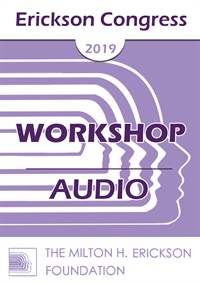
- Average Rating:
- Not yet rated
- Topic Areas:
- Workshops | Grief | Ericksonian Hypnosis and Therapy Techniques | Ericksonian Psychotherapy | Hypnosis | Psychotherapy | Aging and Mortality
- Categories:
- Erickson Congress | Erickson Congress 2019
- Faculty:
- Teresa Garcia-Sanchez, MA
- Duration:
- 1 hour 46 minutes
- Format:
- Audio Only
- Original Program Date:
- Dec 15, 2019
- Short Description:
- Loved ones leave us, couples and friends separate, we suffer physical changes as we grow up during adolescence and as we grow old, work changes happen, as well as our mood, which evolves throughout our lives.
- Price:
- $15.00 - Base Price
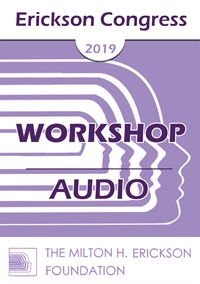
- Average Rating:
- Not yet rated
- Topic Areas:
- Workshops | Ericksonian Psychotherapy | Psychotherapy | Ericksonian Hypnosis and Therapy Techniques | Unconscious Processes
- Categories:
- Erickson Congress | Erickson Congress 2019
- Faculty:
- Teresa Robles, MA, PhD
- Duration:
- 1 Hour 30 Minutes
- Format:
- Audio Only
- Original Program Date:
- Dec 15, 2019
- Short Description:
- Dr. Erickson proposed that all our life experiences were learnings and resources registered in our Unconscious Mind. He considered Unconscious Mind as a Wise Part. For Quantum Physics in the same way that all the information about each person is in its DNA, the information of the Whole Universe is present in each one of its parts. I call that information our Universal Wisdom. Wisdom, because it is all the information and Universal because it is the same everywhere. For me Universal Wisdom is the Creative Force, and so, Almighty. That is not a question of beliefs but a question of imagining. What we imagine for our brain is stronger than what it recognizes as reality.
- Price:
- $15.00 - Base Price
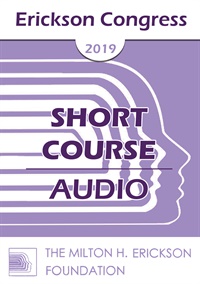
- Average Rating:
- Not yet rated
- Topic Areas:
- Short Courses | Children and Adolescent Therapy | Ericksonian Psychotherapy | Psychotherapy | Ericksonian Hypnosis and Therapy Techniques | Family Therapy
- Categories:
- Erickson Congress | Erickson Congress 2019
- Faculty:
- Maria Escalante de Smith, MA
- Duration:
- 1 Hour
- Format:
- Audio Only
- Original Program Date:
- Dec 12, 2019
- Short Description:
- Ericksonian Psychotherapy emphasizes the importance of utilization. When treating children, as therapists, we need to keep in mind that we also need to utilize whatever happens during therapy whether that can be a given behavior, if the child brings a toy for the consultation, their likes and also provide them with a wide array of resources they can access during therapy.
- Price:
- $15.00 - Base Price
- Average Rating:
- Not yet rated
- Topic Areas:
- Master Classes | Hypnosis | Psychotherapy | Ericksonian Hypnosis and Therapy Techniques | Strategic Therapy | Ericksonian Psychotherapy | Experiential Therapy | Hypnotherapy
- Categories:
- Brief Therapy Conference | Brief Therapy Conference 2018
- Faculty:
- Michael Yapko, PhD | Jeffrey Zeig, PhD
- Course Levels:
- Master Degree or Higher in Health-Related Field
- Duration:
- 2:56:13
- Format:
- Audio and Video
- Original Program Date:
- Dec 10, 2018
- Short Description:
- Ericksonian hypnotherapy and strategic approaches promote experiential methods of change. In combination they can be synergistic. Psychotherapy is best when clients have the experience of an alive, goal-oriented therapeutic process. Such dynamic empowering experiences pave the way for new understandings and growth-oriented possibilities. Drs. Yapko and Zeig will engage with each other and the participants to examine commonalities and differences in their work. The Master Class centers on providing then deconstructing demonstrations of Ericksonian Psychotherapy and Hypnosis, providing a unique opportunity for in-depth learning.
- Price:
-
Sale is $29.00
price reduced from Base Price - $59.00
- Average Rating:
- Not yet rated
- Topic Areas:
- Master Classes | Hypnosis | Psychotherapy | Ericksonian Hypnosis and Therapy Techniques | Ericksonian Psychotherapy | Experiential Therapy | Hypnotherapy
- Categories:
- Brief Therapy Conference | Brief Therapy Conference 2018
- Faculty:
- Michael Yapko, PhD | Jeffrey Zeig, PhD
- Course Levels:
- Master Degree or Higher in Health-Related Field
- Duration:
- 2:43:33
- Format:
- Audio and Video
- Original Program Date:
- Dec 10, 2018
- Short Description:
- Ericksonian hypnotherapy and strategic approaches promote experiential methods of change. In combination they can be synergistic. Psychotherapy is best when clients have the experience of an alive, goal-oriented therapeutic process. Such dynamic empowering experiences pave the way for new understandings and growth-oriented possibilities. Drs. Yapko and Zeig will engage with each other and the participants to examine commonalities and differences in their work. The Master Class centers on providing then deconstructing demonstrations of Ericksonian Psychotherapy and Hypnosis, providing a unique opportunity for in-depth learning.
- Price:
-
Sale is $29.00
price reduced from Base Price - $59.00
Credit available - Click Here for more information
- Average Rating:
- Not yet rated
- Topic Areas:
- Clinical Demonstrations with Discussant | Psychotherapy | Evocative Communication | Brief Therapy | Ericksonian Psychotherapy | Ericksonian Hypnosis and Therapy Techniques | Experiential Therapy | Strategic Therapy
- Bundle(s):
- Learning Track - EP17 Erickson Stream
- Categories:
- Evolution of Psychotherapy | Evolution of Psychotherapy 2017 | Evolution of Psychotherapy Erickson Learning Track | Online Continuing Education
- Faculty:
- Jeffrey Zeig, PhD | Otto Kernberg, MD
- Course Levels:
- Master Degree or Higher in Health-Related Field
- Duration:
- 1:24:21
- Format:
- Audio and Video
- Original Program Date:
- Dec 14, 2017
- Short Description:
- Experiential components central to brief, strategic approaches to psychotherapy. We will compare and contrast Ericksonian and psychodynamic perspectives.
- Price:
-
Sale is $29.00
price reduced from Base Price - $59.00
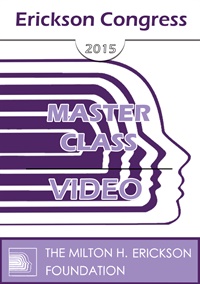
- Average Rating:
- Not yet rated
- Topic Areas:
- Ericksonian Psychotherapy | Psychotherapy | Master Classes | Brief Therapy | Ericksonian Hypnosis and Therapy Techniques | Self-Relations | Experiential Therapy | Hypnosis
- Categories:
- Erickson Congress | Erickson Congress 2015 | Master Class
- Faculty:
- Jeffrey Zeig, PhD | Stephen Gilligan, PhD
- Course Levels:
- Master Degree or Higher in Health-Related Field
- Duration:
- 5 Hours 9 Minutes
- Format:
- Audio and Video
- Original Program Date:
- Dec 13, 2015
- Short Description:
- Ericksonian hypnotherapy and the Self-Relations approach are experiential methods of change. In combination they can be synergistic. Psychotherapy is best when clients have a first-hand experience of an alive therapeutic process. Such dynamic empowering experiences pave the way for dynamic understandings. Drs. Gilligan and Zeig will engage with each other and the participants to examine commonalities and differences in their work.
- Price:
- $99.99 - Base Price
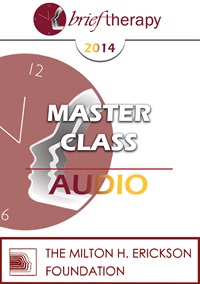
- Average Rating:
- Not yet rated
- Topic Areas:
- Ericksonian Psychotherapy | Master Classes | Brief Therapy | Ericksonian Hypnosis and Therapy Techniques | Experiential Therapy | Psychotherapy | Solution Oriented Approach
- Categories:
- Brief Therapy Conference | Brief Therapy Conference 2014 | Master Class
- Faculty:
- Jeffrey Zeig, PhD | Bill O'Hanlon, MS
- Duration:
- 5:51:06
- Format:
- Audio Only
- Original Program Date:
- Dec 15, 2014
- Short Description:
- Many schools of psychotherapy have been derived from the seminal work of Milton H Erickson M.D., including strategic therapy, interactional therapy, NLP and solution focused therapy. In some approaches hypnosis is central; in other approaches hypnosis is more peripheral. This class features two experts personally trained by Dr. Erickson, each of whom approach psychotherapy from somewhat different perspectives. In his approach, Possibility Therapy, Bill O'Hanlon epitomizes the strengths of a solution focused orientation. In his experiential approach, Jeffrey Zeig shades treatment in the direction of developing dramatic reference experiences.
- Price:
- $15.00 - Base Price
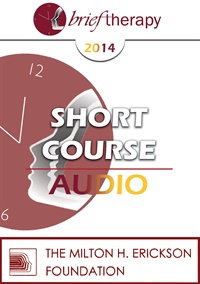
- Average Rating:
- Not yet rated
- Topic Areas:
- Ericksonian Psychotherapy | Psychotherapy | Trauma | Short Courses | Children and Adolescent Therapy | Pain and Healing | Brief Therapy | Ericksonian Hypnosis and Therapy Techniques
- Categories:
- Brief Therapy Conference | Brief Therapy Conference 2014
- Faculty:
- Maria Escalante de Smith, MA
- Duration:
- 1:09:29
- Format:
- Audio Only
- Original Program Date:
- Dec 11, 2014
- Short Description:
- When children experience painful emotions and anxiety after going through traumatic events they may not be able to understand what is happening to them and thus get depressed. Other consequences may appear, like lack of concentration or academic problems. Attendants will learn how treat these conditions by using brief Ericksonian techniques, assignments, and toys and by including the family members during therapy.
- Price:
- $15.00 - Base Price

- Average Rating:
- Not yet rated
- Topic Areas:
- Psychotherapy | Workshops | Generative Psychotherapy | Ericksonian Psychotherapy | Self-Relations | Resources
- Categories:
- Evolution of Psychotherapy | Evolution of Psychotherapy 2013
- Faculty:
- Stephen Gilligan, PhD
- Duration:
- 2 Hours 42 Minutes
- Format:
- Audio Only
- Original Program Date:
- Dec 14, 2013
- Short Description:
- This workshop presents the Ericksonian and Self-Relations Psychotherapy approach to human states of suffering: depression, anxiety, trauma, addiction, etc. This practical and positive approach assumes that each core human experience has equivalent potential to be positive or negative, depending on the human relationship to it; and thus focuses on how problems can be transformed into resources by skillful human connection. This process operates at two levels: (1) developing a generative state (in the therapist, client, and relationship field) and then (2) using specific methods of transforming negative experiences and behaviors.
- Price:
- $15.00 - Base Price
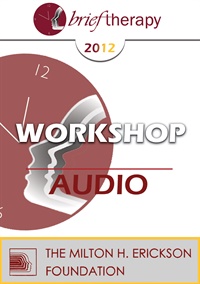
- Average Rating:
- Not yet rated
- Topic Areas:
- Family Therapy | Psychotherapy | Workshops
- Categories:
- Brief Therapy Conference | Brief Therapy Conference 2012
- Faculty:
- Camillo Loriedo, MD, PhD
- Duration:
- 2:49:55
- Format:
- Audio Only
- Original Program Date:
- Dec 06, 2012
- Short Description:
- BT12 Workshop 10 – Brief Family Therapy – Camillo Loriedo, MD, PhD The therapeutic relationship appears to be the key element for short-term treatment. The use of rapport in Ericksonian Psychotherapy is an excellent example of the essential use of the therapeutic relationship in Brief Family Therapy. As demonstrated by Carl Whitaker’s position in family therapy, therapist’s emotions, fantasies, and isomorphic behaviors can provide useful suggestions both for diagnosing and effectively utilizing the therapeutic relationship.
- Price:
- $15.00 - Base Price
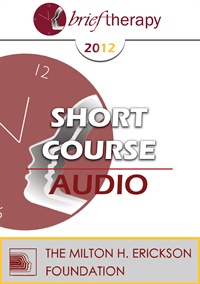
- Average Rating:
- Not yet rated
- Topic Areas:
- Psychotherapy | Short Courses
- Categories:
- Brief Therapy Conference | Brief Therapy Conference 2012
- Faculty:
- Daniel Bass
- Duration:
- 1:30:16
- Format:
- Audio Only
- Original Program Date:
- Dec 05, 2012
- Short Description:
- BT12 Short Course 04 – Using Movies in Ericksonian Therapy – Daniel Bass, Dipl. Psych Movies are complex multisensory stories reflecting a specific world. They transport messages and solutions in order to provide the viewer with the possibility of identifying with the movie characters, get absorbed in it, empathize, recognize consciously or subconsciously one’s own central topics in life. They provide the possibility of being catalysts for developmental processes that can be used in psychotherapy. In this presentation participants will learn about the processes of watching movies and the transfer into therapy.
- Price:
- $15.00 - Base Price
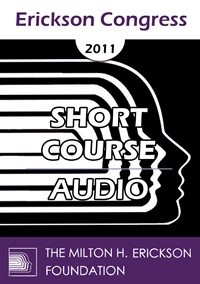
- Average Rating:
- Not yet rated
- Topic Areas:
- Ericksonian Psychotherapy | Psychotherapy | Short Courses | Ericksonian Hypnosis and Therapy Techniques | Art and Creativity | Unconscious Processes
- Categories:
- Erickson Congress | Erickson Congress 2011
- Faculty:
- Daniel Bass
- Duration:
- 56:11
- Format:
- Audio Only
- Original Program Date:
- Dec 09, 2011
- Short Description:
- Movies are complex multi-sensory stories reflecting a specific world, transporting messages and solutions in order to provide the viewer with the possibility of identifying with the movie characters. Viewers get absorbed in movies and empathize, recognize consciously or subconsciously one’s own central topics in life. They provide the possibility of being catalysts for developmental processes that can be used in psycho-therapy. In this presentation participants will learn about the processes of watching movies and the trans-fer into therapy.
- Price:
- $15.00 - Base Price
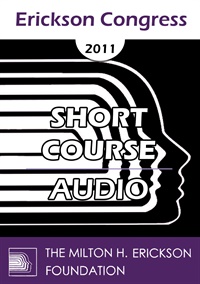
- Average Rating:
- Not yet rated
- Topic Areas:
- Ericksonian Psychotherapy | Psychotherapy | Short Courses | Ericksonian Hypnosis and Therapy Techniques | Femininity
- Categories:
- Erickson Congress | Erickson Congress 2011
- Faculty:
- Maria Escalante de Smith, MA
- Duration:
- 1:22:02
- Format:
- Audio Only
- Original Program Date:
- Dec 09, 2011
- Short Description:
- When women face unexpected pregnancies, they may experience a variety of feelings. Ericksonian techniques can help them consider alternatives. Short crises interventions such as future rehearsal and utilization will also be discussed as Ericksonian tools to be used during single session therapy. Participants will be able to discuss different alternatives such as adoption and ways to help keep their baby will be promoted. Age regression for coping with post-abortion syndrome will be described.
- Price:
- $15.00 - Base Price
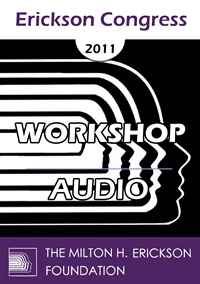
- Average Rating:
- Not yet rated
- Topic Areas:
- Hypnosis | Psychotherapy | Workshops | Ericksonian Hypnosis and Therapy Techniques | Ericksonian Psychotherapy | Pain and Healing | Metaphors
- Categories:
- Erickson Congress | Erickson Congress 2011
- Faculty:
- Teresa Garcia-Sanchez, MA
- Duration:
- 59 Minutes
- Format:
- Audio Only
- Original Program Date:
- Dec 07, 2011
- Short Description:
- Ericksonian psychotherapy and hypnosis treatment (done in conjunction with the latest advances in medicine) of a multiple sclerosis (MS) case will be reported. Ten years later, medical reports show 95% recovery based on the evidence of the scanned images that will be presented as well as patient’s feed-back videos and a full description of the development of the illness and treatment.
- Price:
- $20.00 - Base Price
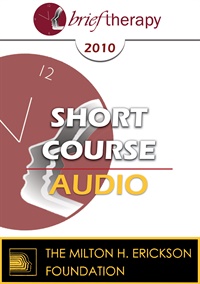
- Average Rating:
- Not yet rated
- Topic Areas:
- Psychotherapy | Short Courses | Ericksonian Psychotherapy | Ericksonian Hypnosis and Therapy Techniques
- Categories:
- Brief Therapy Conference | Brief Therapy Conference 2010
- Faculty:
- Maria Escalante de Smith, MA
- Duration:
- 1:27:11
- Format:
- Audio Only
- Original Program Date:
- Dec 09, 2010
- Short Description:
- Women who face unplanned pregnancies may experience a wide range of emotions and go through deep crises when they learn they are pregnant. In this workshop, the presenter will describe how brief Ericksonian interventions can help them explore possibilities and cope with their crises during unplanned pregnancy. Examples of quick interventions and conversational trance will be given as well. There will be references to the importance of hope and exercises for coming to terms with previous experience.
- Price:
- $15.00 - Base Price
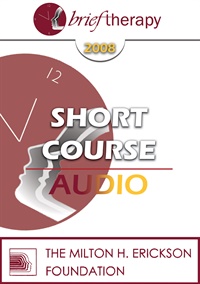
- Average Rating:
- Not yet rated
- Topic Areas:
- Short Courses | Children and Adolescent Therapy | Ericksonian Psychotherapy | Divorce | Psychotherapy | Ericksonian Hypnosis and Therapy Techniques
- Categories:
- Brief Therapy Conference | Brief Therapy Conference 2008
- Faculty:
- Maria Escalante de Smith, MA
- Duration:
- 1:25:05
- Format:
- Audio Only
- Original Program Date:
- Dec 11, 2008
- Short Description:
- Ericksonian psychotherapy emphasizes the utilization of people's resources. When working with children of divorced parents, I focus on strengths and keep in mind the Ericksonian interventions should be brief because children may get tired of being in therapy for a long time. In a case with two children, techniques including the use of toys will be discussed. How to make several brief interventions quickly while utilizing "toy co-therapists" in home assignments, and the combination of conversational trance with tasks will be emphasized. There also will be references to the importance of working with the family system.
- Price:
- $15.00 - Base Price
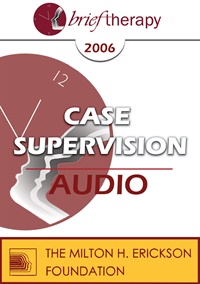
- Average Rating:
- Not yet rated
- Topic Areas:
- Supervision Panels | Abuse | Couples Therapy | Supervision | Community | Cultural and Social Contexts | Domestic Violence | Suicide | Support System | Cognitive Psychology | Family Systems | Resilience
- Categories:
- Brief Therapy Conference | Brief Therapy Conference 2006 | Pioneers in Couples and Family Therapy
- Faculty:
- Jeffrey Zeig, PhD | Cloe Madanes, HDL, LIC
- Duration:
- 2:36:42
- Format:
- Audio Only
- Original Program Date:
- Dec 09, 2006
- Short Description:
- This workshop focuses on addressing spousal abuse through community-based strategies and cultural adaptation. Key topics include a 13-step reconciliation process, the Ericksonian method of using incentives to deter violence, and involving elders and community leaders in interventions. The session highlights the emotional bond between victims and abusers, the need for immediate safety, and the importance of systemic change to break the cycle of abuse.
- Price:
- $15.00 - Base Price
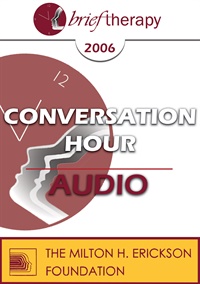
- Average Rating:
- Not yet rated
- Topic Areas:
- Conversation Hours | Abuse | Couples Therapy | Brief Therapy | Cross-Cultural Therapy | Cultural and Social Contexts | Domestic Violence | Intervention Planning | Protective Strategies
- Categories:
- Brief Therapy Conference | Brief Therapy Conference 2006 | Pioneers in Couples and Family Therapy
- Faculty:
- Cloe Madanes, HDL, LIC
- Duration:
- 1:03:02
- Format:
- Audio Only
- Original Program Date:
- Dec 08, 2006
- Short Description:
- This session presents a strategic approach to addressing spousal abuse, emphasizing the use of third parties, such as extended family, to deter violence. Key techniques include creating intervention contracts involving disliked individuals and promoting empathy to prevent abuse. The discussion also covers strategies for breaking patterns of abusive relationships and the need to adapt therapy to fit diverse cultural norms.
- Price:
- $15.00 - Base Price
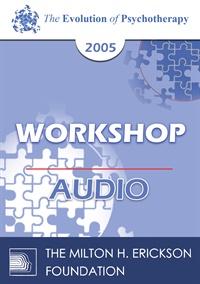
- Average Rating:
- Not yet rated
- Topic Areas:
- Workshops | Ericksonian Hypnosis and Therapy Techniques | Hypnosis | Arm Levitation | Psychotherapy | Ericksonian Psychotherapy | Neuroscience | Hypnotic Phenomena
- Categories:
- Evolution of Psychotherapy | Evolution of Psychotherapy 2005
- Faculty:
- Ernest Rossi, PhD
- Duration:
- 2 Hours 12 Minutes
- Format:
- Audio Only
- Original Program Date:
- Dec 07, 2005
- Short Description:
- Erickson's hand levitation and pantomime techniques have evolved into simple, easy to learn, activity-dependent approaches to therapeutic hypnosis, and are consistent with the theory and research of the current neuroscience on brain plasticity and the molecular genomic level of psychotherapy. Demonstrations with volunteers from the audience will illustrate.
- Price:
- $15.00 - Base Price


